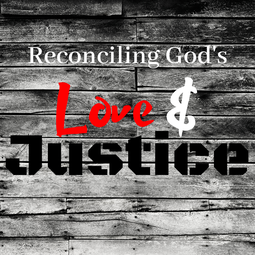 Actual Question: "As protestants we talk a lot about saved by grace alone but James says ‘faith without works is dead'. Of course I know the word ‘alone’ is not in the text, so what gives? (PS - I hate the ‘balance explanation)" Possible Answer: This is a question that I've often thought about myself and in my mind it's usually phrased like this, "What's the balance between faith and works?" or as was submitted in the question above, we insert the word, "alone". As we tackle this important topic it's important to note from the start that neither Paul in his discourse on faith nor James in his dealings with works ever use the words "balance", "alone" or "only" or any other similarly exclusive term to communicate that one of these vital ingredients is sufficient without the other. It was never about one over the other or about either being in any sort of competition with the other. Secondly, Paul and James were writing to different audiences who were dealing with different sets of struggles that they were attempting to address with different solutions. To conclude, as some do, that their prescriptions were somehow contradictory to one another is misinformed and out of context. James is writing to the "twelve tribes, who were dispersed abroad" (see James 1:1 NASB). His audience was clearly in need of some practical day to day advice on how to live in a way that brought glory to God. From the outset of his letter he repeatedly addresses practical topics like: facing trials, dealing with temptation, the famous verse of James 1:19 (NASB), "This you know, my beloved brethren. But everyone must be quick to hear, slow to speak and slow to anger...". He challenged the people to not just be hearers of the Word but doers as well, he spoke out against the dangers and power of the uncontrolled tongue and about the dangers of favoritism and the importance of treating the poor with dignity. When you zoom out and consider all that James was addressing it becomes clear that his emphasis on the importance of works was never designed to speak against the importance of faith but rather to highlight the requirement of "spiritual fruit" in the life of a true believer. He makes no assertion that works were or should ever be an avenue to redemption, but rather an overflow of the believer's redemption. Paul in his letter to the Romans is dealing with a separate set of issues. He's writing of course to the church in Rome who were in need of a fuller understanding of the righteousness of God and the offer afforded them through the sacrifice of Jesus. J Vernon MGee in his commentary powerfully phrases it like this, "Friend, may I say to that the thief on the cross had been declared unfit to live in the Roman empire and was being executed. But the Lord Jesus said that He was going to make him fit for Heaven and told him, "...Today shalt thy be with me in paradise." (Luke 23:43). God takes lost sinners - like I am, like you are - and He brings them into the family of God and makes them sons of God. And He does it because of Christ's death upon the cross - not because there is any merit in us. This is the great message of the Romans." Paul was clearly communicating the power of the Cross that was available to all who would believe and have "faith" in the sacrifice of Jesus for the forgiveness of their sins. Lastly, it's important to understand the relationship between James' definition of "works" and Paul's definition of "faith". Paul's definition of "faith" was an effort to strike at the very heart of the Gospel, faith in Jesus' work on the cross is paramount in our being saved from our sins. A million "works" earn us nothing towards being made right in God's sight. The only wage we earn for all of our efforts is death (Romans 6:23 (NASB). We are only saved through faith in Jesus Christ. James' definition of "works" centers around believer's becoming the modern day hands and feet of Jesus. Why are we saved? To carry the message forward to those who have not yet received this free gift. Let's think about "faith" and "works" not as competitors but rather as different functions and stages in the same journey. We are first and foremost called to faith in Christ's work on the cross. We are then called to walk out that saving faith through our works that lift up and magnify the name of Jesus so that others might also come to faith. It's symbiosis at its' finest. You've heard of this right? It's the, "interaction between two different organisms living in close physical association, typically to the advantage of both." As we first enter into a saving relationship with God through "faith" in Jesus our "works" flow naturally from that genuine heart change. As our "works" increase and we witness firsthand the faithfulness of God as He gives us boldness, success and even the tough lessons in failure our "faith" in God increases. Round and round we go in an ever increasing symbiotic upward spiral towards greater intimacy with God. We are saved by our faith in Jesus and we step into the fullness of God through our works. Be encouraged and keep moving forward.  Nahum like all of the others that we’ve looked at was a prophet, he was handing out the message of God to the people of Ninevah, the same people group that Jonah, likely the more well-known prophet was challenging. If you fast-forward about 150 years you come upon Nahum who is giving the very same message to the people of Ninevah because they had once again gotten off track. Here's some quick background on Ninevah. Ninevah is the capital city of Assyria. Assyria had been on a rampage for hundreds of years conquering all sorts of lands and cities. Nahum 3:8 tells us that Assyria had conquered the city of No-amon (or Thebes) all the way down in Egypt. Assyria had a wide and rather unfriendly reach. If the book of Jonah is about God’s compassion for the people of Ninevah then the book of Nahum is about God’s vengeance towards the people of Ninevah. They had been given multiple chances to get it right but were still choosing to turn their back on God. What’s more interesting about this whole Assyrian thing is that they weren’t just conquering these areas and collecting taxes or stealing their stuff, they were taking it a step further and were actively working to convert these areas towards their way of idol worship. The people of Ninevah were directly responsible for pulling people away from God's way of doing things. God could not allow this to continue. I see two very important lessons for us in the account of Nahum. The first is one that we won’t fully understand in this lifetime but we need to at least begin to think about. God is loving and forgiving and God is just and vengeful. It’s the same God in Jonah who says to the people of Ninevah, "Repent, come back, turn around, stop doing that, I’m giving you another chance." That’s the same God who in the book of Nahum says to the people of Ninevah, "I won’t leave you unpunished, I will cut you off, you will be consumed, I will make an end of you, I will pour out my wrath on you." How do we reconcile these two things? I think at least in part we reconcile these ideas by realizing that they aren’t opposite of one another. I think we’ve bought into this idea that if you love something then that automatically means you’ll never do the tough thing, the hard thing to protect it or save it. We say things like, “Well if God is love then why would he allow people to make bad choices and go to hell?” Well it’s precisely because of God’s loving nature that he allows us to make our own choice. Yes he could force us to do the right thing but that wouldn’t be very loving would it? It’s because of God’s love for us and in this case the people of Ninevah that he allowed them to make their own choice and unfortunately, they chose to turn their backs on God. And in the end it was because of His love for the people of Judah who were being overrun by the people of Ninevah that He chose to deal justly with the people of Ninevah and to wipe them out. I came across a commentary on www.overviewbible.com that phrased it like this, “God is safety to those who fear Him, but danger to those who disregard Him.” Secondly, you’d have to live under a rock to not know that there is some really crazy, sinful stuff happening in our world today. It seems like those who are following Jesus are becoming fewer and fewer and it can be pretty discouraging when you start to feel like you’re in the minority. That's likely what the people of Judah were feeling as they had spent all of these generations under oppression from the people of Ninevah. It was becoming more and more difficult for them to stay true to what they knew God was calling them to because everyone around them had thrown in the towel on this "God thing". Nahum message comes at a tough time for the people of Judah, many were perhaps wondering how much longer they could stand under such harsh circumstances without caving in to the idol worship. No doubt each of us have felt overwhelmed by the darkness, both within ourselves and in our world. Perhaps you've found your will to do what’s right weakening as you've become discouraged with what you see in your life and in the world around you? What Nahum reminds us of is that God’s active hand is working even in the darkest of times to bring justice and hope to the world. God hasn’t forgotten about you. God hasn’t given up on bringing restoration and justice to the world. Be encouraged and keep moving forward.  Let's talk about Jonah... It wasn’t that long ago that I spent several days reading and re-reading the book of Jonah. Now, before you applaud my amazing commitment to Bible study, you should know it's only 4 chapters long. You could read it in its entirety in like 5 minutes. So just to review Jonah is a prophet and a prophet was and is someone who receives a message from God and then delivers that message to the people and as you already know, prophets generally fall into one of two categories. Category one, "Great job everybody" and category two, "You guys are going to get wiped out if you don’t shape up." Jonah falls into category #2 in that God had instructed Jonah, as one of His prophets, to go directly to the Assyrian capital city of Ninevah to deliver a message of coming destruction if the people didn't repent and turn back to God. On Bible Gateway Jonah 1:1-2 (NASB) says, “The word of the Lord came to Jonah the son of Amittai saying, “Arise, go to Nineveh the great city and cry against it, for their wickedness has come up before Me.” Now before you disconnect, take a minute to recognize how similiar you and I are to Jonah. He does what some of us might do when tasked with a significant challenge, he does what comes naturally to many throughout history, he runs. He runs as far in the opposite direction as possible. He heads to the port of Joppa, boards a ship and makes off for the city of Tarshish. Jonah 1:3 (NASB) says, “But Jonah rose up to flee to Tarshish from the presence of the Lord. So he went down to Joppa, found a ship which was going to Tarshish, paid the fare and went down into it to go with them to Tarshish from the presence of the Lord.” Some of you are familiar with the rest of this account but for those who aren’t, God comes back on to the scene and in a way that only God can He ever so gently attempts to grab Jonah’s attention. Jonah 1:4 (NASB) says, “The Lord hurled a great wind on the sea and there was a great storm on the sea so that the ship was about to break up.” Let's push pause here for a second? How many of you know that there are times in our lives when we go through storms? Nuff said, we all get it right? I bring this up because I think too often we blame God for the storms we experience in life. We say things like…
"What we forget is that sometimes the storms we experience in life are brought on us…by us." Why did Jonah find himself in the midst of a storm? He found himself in the midst of a storm because of his disobedience to God. Sometimes we can create our own storm by our poor decisions or our poor judgement. We get impatient and we don’t want to wait on God, or we disagree with God’s calling or His answer so we take things into our own hands and then when the storms come we're looking around in disbelief that God would allow this to happen. So before we go any further I want to just pause here for a minute and ask you to evaluate the source of your storms. Following Jesus isn’t easy to begin with but we make it so much more difficult when we choose to ignore His leading. Jonah’s account goes on in verses 5-8...Jonah 1:5-8 (NIV) says, “Then the sailors became afraid and every man cried to his god, and they threw the cargo which was in the ship into the sea to lighten it for them. But Jonah had gone below into the hold of the ship, lain down and fallen sound asleep. So the captain approached him and said, “How is it that you are sleeping? Get up, call on your god. Perhaps your god will be concerned about us so that we will not perish.” Each man said to his mate, “Come, let us cast lots so we may learn on whose account this calamity has struck us.” So they cast lots and the lot fell on Jonah. Then they said to him, “Tell us, now! On whose account has this calamity struck us? What is your occupation? And where do you come from? What is your country? From what people are you?” Up to and until this point Jonah was just this faceless stowaway on the boat, the guy who quietly slipped in, slid his way to the bottom deck and found a quiet corner to hide in, suddenly he’s thrust into the spotlight. Now these sailors want answers. These are guys whose livelihood and at this point their very survival is based on the success of this voyage and here they are standing in front of Jonah demanding some answers. Listen to Jonah’s response in verse 9 of chapter 1. Jonah 1:9 (NASB) says, He answered, “He said to them, “I am a Hebrew, and I fear the Lord God of heaven who made the sea and the dry land.” We read that verse at first and we’re like, “Yeah, Jonah was a Hebrew…” What’s the big deal?" But notice what he says in the second half of that verse, he says, “…I worship the Lord, the God of heaven, who made the sea and the dry land.” Let’s think about that verse again in the context of what was actually happening in Jonah’s life at that moment. Jonah makes the statement, “I worship the Lord, the God of heaven…” as he’s on a boat headed away from God’s plan for his life. As I read that verse over and over again, I was struck by the ridiculousness of what was being stated. Jonah was "saying" that he worshipped the Lord, the God of Heaven yet he was on a ship headed away from where God was clearly calling him. How do you justify that? As I read that verse again and again I kept thinking, “Could Jonah really identify himself as someone who worshipped God and yet still completely ignore His leading?” That’s the question I would ask us as well. “Can we really identify ourselves as those who worship God while at the same time be running away from what He’s calling us to?” Be encouraged and keep moving forward. |
Archives
April 2022
|
 RSS Feed
RSS Feed